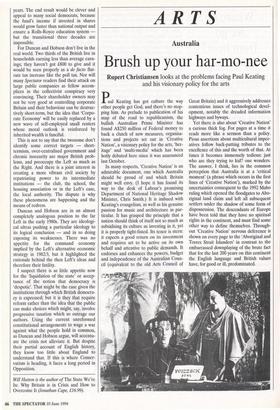Where do we go from here?
Will Hutton
SATURN'S CHILDREN by Alan Duncan and Dominic Hobson Sinclair-Stevenson, £16.99, p. 448 Routing your enemies can be a disorienting experience, especially if you have always defined yourself as what they are not. Once they're gone you're left in a vacuum. What are you for, now that you've won?
Thus the Conservative party in the middle of the 1990s. Its heady flirtation with ideology gave it Lady Thatcher and the 1980s upon which it looks back fondly — but the victories over trade unions, nationalised industries, local authorities and the wider collapse of communism have left it rudderless. With Tony Blair's 'New' Labour party espousing more overtly capitalist-friendly policies than ever in its history, the enemies to slay in the defence of middle England are no longer obvious. Worse still, England may be threatened by the very forces of overfree markets and an arbitrary political system that the Conservative party itself has unleashed and exploited.
This unnerving idea is obviously not very congenial to the Right, and the importance of Saturn's Children by Conservative MP Alan Duncan and his associate Dominic Hobson is that in its 448 pages it follows through the ideological logic of where the Conservative party should now go if it denies that the policies of the last 16 years have had any part in creating — to coin a phrase — the state we're in. Plainly the emerging signs of a crisis of legitimacy of British political institutions, the social frag- mentation that disfigures the country, the stubborn refusal of the economy to ignite into capitalist dynamism and the decay of a moral order cannot be connected in any way with structural faults in the approach of the last 16 years.
Instead they plead that Conservatives, like fanatics everywhere, should redouble their efforts to pursue the right path to address these ills.. Unconsciously echoing Mao and Pol Pot in their nihilistic ideologi- cal fervour, Duncan and Hobson want col- lectivism in any form to be slain and, as they would put it, the ancient liberties of freeborn Englishmen rediscovered. Thus can a sturdy English individualism be reborn and with it a new moral order that can resuscitate everything from a still ailing economy to the unutterably compromised handmaiden of the state — the Church of England.
The two mock any notion that the untrammelled power of the state that they deplore — the embodiment of collectivism — has anything to do with Britain's politi- cal constitution. Royal prerogative power may have been delegated to a sovereign House of Commons where the majority party combines executive discretion and control of the legislature in a fashion unmatched in any other western democracy — but that argument is dismissed. But is it possible to explain the establishment of the Child Support Agency, for example, with- out a formal system for redress of grievances, or the idea of a national identi- ty card with the individual being offered no proper protection from abuse without any reference to the lack of checks and bal- ances in Britain's unwritten constitution?
Duncan and Hobson will have none of this. Their preferred solution is to leave the entire pre-modern apparatus in place, but instead dramatically shrink government spending and thus the state's scope for intrusion. Yet even if this could be done along the lines they suggest — itself a hazardous enterprise — surely the Home Secretary of the day would still be able to countenance such a national identity card, and a constitution which treats citizens as subjects would still not be able to confer basic protections for that very reason. Subjects do not get protection from state abuse.
In any case, the duo's proposals for reducing state spending are unconvincing. Here they have to confront the difficulty that, for all the talk of an unbound state leviathan, approaching half of government expenditure is transfer payments, and most of those that receive them, whether old or economically inactive, are obviously , in need. On top of this, resources have to be allocated to health and education, and there is the painful political reality that the electorate is wedded to the National Health Service, which is also remarkably cheap.
So the NHS would be left in place. The system of transfer payments would be replaced by a basic income for all, which most economists think would be more expensive. And the 'liquidation of state education' would be prosecuted over 30 years. The end result would be clever and appeal to many social democrats, because the fund's income if invested in shares would grow faster than national output and ensure a Rolls-Royce education system — but the transitional three decades are impossible.
For Duncan and Hobson don't live in the real world. Two thirds of the British live in households earning less than average earn- ings; they haven't got £800 to give and it would be seen properly as a de facto flat- rate tax increase like the poll tax. Nor will many Spectator readers find their attack on large public companies as fellow accom- plices in the collectivist conspiracy very convincing. Their shareholder owners may not be very good at controlling corporate Britain and their behaviour can be destruc- tively short-term, but the idea that 'Corpo- rate Economy' will be easily replaced by a new wave of self-employed small renters whose moral outlook is reinforced by inherited wealth is fanciful.
This is not to say that the twosome don't identify some correct targets — short- termism, over-centralised government and chronic insecurity are major British prob- lems, and preoccupy the Left as much as the Right. And there is a joint interest in creating a more vibrant civil society by repatriating power to its intermediate institutions — the club, the school, the housing association or in the Left's case, the local authority. The dispute is why these phenomena are happening and the means of redress.
Duncan and Hobson are in an almost completely analogous position to the far Left in the early 1980s. They are ideologi- cal ultras pushing a particular ideology to its logical conclusion — and in so doing exposing its weaknesses. There was no appetite for the command economy implied by the Left's alternative economic strategy in 1982/3, but it highlighted the rationale behind the then Left's ideas and therefore their futility.
I suspect there is as little appetite now for the 'liquidation of the state' or accep- tance of the notion that democracy is 'despotic'. That might be the case given the institutions through which British democra- cy is expressed; but it is they that require reform rather than the idea that the public can make choices which might, say, involve progressive taxation which so outrage our authors. Using the current unreformed constitutional arrangements to wage a war against what the people hold in common, as Duncan and Hobson argue, will accentu- ate the crisis not alleviate it. But despite their partial account of English history, they know too little about England to understand that. If this is where Conser- vatism is heading, it faces a long period in Opposition.
Will Hutton is the author of The State We're In: Why Britain is in Crisis and How to Overcome It (Jonathan Cape, £16.99).



































































 Previous page
Previous page